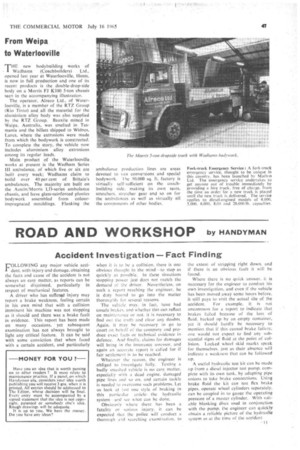ROAD AND WORKSHOP by HANDYMAN
Page 49

If you've noticed an error in this article please click here to report it so we can fix it.
Accident Investigation Fact Finding
FOLLOWING any major vehicle accident, with injury and damage, obtaining the facts and cause of the accident is not always an easy matter, as reports can be somewhat disjointed, particularly in respect of mechanical features.
A driver 'who has sufferqd injury may report a brake weakness, feeling certain in his own mind that with a collision imminent his machine was not stopping as it should and there was a brake fault in evidence. This report has been made on many occasions, yet subsequent examination has not always brought to light any critical feature. It can be said with some conviction that when faced with a certain accident, and particularly
when it is to be a collision, there is one obvious thought in the mind—to stop as quickly as possible. In these situations stopping power just does not match the demand of the driver, Nevertheless. on such a report reaching the engineer, he is duty ['mind to go into the matter thorough It, for several reasons.
The vehicle may. in fact. have had unsafe brakes. and whether this can reflect on maintimance or not. it is necessary to find out the truth and clear any doubts. Again, it may he necessary to go to Court on behalf of the company and produce exact Facts or technical evidence in defence. And finally, claims for damages will bring in the insurance assessor. and again an accurate report is called for if fair settlement is to he reached.
Whatever the reason. the engineer is obliged to investigate fully. Testing a badly smashed vehicle is no easy matter. especially with a dead engine, damaged pipe lines and so on. and certain tackle is needed to overcome such problems. Let us look at just one style of braking in this particular articlethe hydraulic system and cce what can be done.
Obviously where there has been a fatality or serious injury, it can be expected that the police will conduct a thorough and searching examination. to the extent of stripping right down, and if there is an obvious_ fault it will be found.
Where there is no quick answer. it is necessary for the engineer to conduct his own investigation, and even if the vehicle has been moved away some hours before, it still pays to visit the actual Site of the accident. For example. it is not uncommon for a report to indicate that brakes failed because of the loss of fluid, backed up by an empty container, yet it should hardly be necessary to mention. that if this caused brake failure. one would not expect to find any substantial signs of fluid at the point of collision. Locked wheel skid marks speak for themselves, just as their absence will indicate a weakness that can be followed up.
A useful hydraulic test kit can he made up from a diesel injector test pump. complete with its own tank, by adapting pipe unions to take brake connections. Using brake fluid the kit can test flex brake pipes, operate wheel cylinders separately, can be coupled in to gauge the operating pressure of a master cylinder. With suitable blanking discs used in conjunction with the pump. the engineer can quickly obtain a reliable picture of the hydraulic system as at the time of the accident.
—MONEY FOR YOU ?
Have you an idea that is worth passing on to other readers ? It mustrelate to maintenance practice. if a panel, on which Handyman sits, considers your idea worth publishing you will receive 3 gns. when it is printed. All entries should be addressed to The Editor, whose decision will be final. Every entry must be accompanied by a signed statement that the idea is not copyright. patented or somebody else's idea. Rough drawings will be adequate,
It is up to you. We have the money. Do you have any ideas?




























































































































